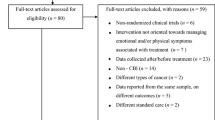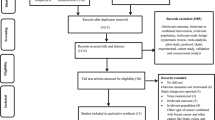This meta-analysis is the first to examine cognitive behavioral therapy (CBT) techniques for distress and pain specifically in breast cancer patients. Twenty studies that used CBT techniques with breast cancer patients were identified and effect sizes were calculated to determine (1) whether CBT techniques have a significant impact on distress and pain, (2) if individual or group treatments are more effective, (3) whether severity of cancer diagnosis influences distress and pain outcomes, and, (4) if there is a relationship between CBT technique efficacy for distress and pain. Results revealed effect sizes of d = 0.31 for distress (p < 0.05) and .49 for pain (p < 0.05), indicating that 62 and 69% of breast cancer patients in the CBT techniques treatment groups had less distress and less pain (respectively) relative to the control groups. Studies with individual treatment approaches had significantly larger effects compared to studies that employed group approaches for distress (p = 0.04), but not for pain (p > 0.05). There were no significant differences in effects between those with or without metastases (p > 0.05). The correlation between effect sizes for distress and pain was not significant (p = 0.07). Overall, the results support the use of CBT techniques administered individually to manage distress and pain in breast cancer patients. However, more well-designed studies are needed.
Similar content being viewed by others
REFERENCES
References marked with an asterisk indicate studies included in the meta-analysis.
American Cancer Society (ACS) (2004). Cancer Facts and Figures, Atlanta, GA, pp. 1–60.
*Arathuzik, D. (1994). Effects of cognitive-behavioral strategies on pain in cancer patients. Cancer Nurs. 17: 207–214.
*Bordeleau, L., Szalai, J. P., Ennis, M., Leszcz, M., Speca, M., Sela, R., et al. (2003). Quality of life in a randomized trial of group psychosocial support in metastatic breast cancer: Overall effects of the intervention and an exploration of missing data. J. Clin. Oncol. 21: 1944–1951.
Bottomley, A. (1996). Group cognitive behavioural therapy interventions with cancer patients: A review of the literature. Eur. J. Cancer Care 5: 143–146.
Butler, L. D., Koopman, C., Cordova, M. J., Garlan, R. W., DiMicelli, S., and Spiegel, D. (2003). Psychological distress and pain significantly increase before death in metastatic breast cancer patients. Psychosom. Med. 65: 416–426.
*Christensen, D. N. (1983). Postmastectomy couple counseling: An outcome study of a structured treatment protocol. J. Sex Marital Ther. 9: 266–275.
Cohen, J. (1992). A power primer. Psychol. Bull. 112: 155–159.
Compas, B. E., Haaga, D. A. F., Keefe, F. J., Leitenberg, H., and Williams, D. A. (1998). Sampling of empirically supported psychological treatments from health psychology: Smoking, chronic pain, cancer, and bulimia nervosa. J. Consult. Clin. Psychol. 66: 89–112.
*Davis, H. (1986). Effects of biofeedback and cognitive therapy on stress in patients with breast cancer. Psychol. Rep. 59: 967–974.
Devine, E. C. (2003). Meta-analysis of the effect of psychoeducational interventions on pain in adults with cancer. Oncol. Nurs. Forum 30: 75–89.
Devine, E. C., and Westlake, S. K. (1995). The effects of psychoeducational care provided to adults with cancer: Meta-analysis of 116 studies. Oncol. Nurs. Forum 22: 1369–1381.
*Edelman, S., Bell, D. R., and Kidman, A. D. (1999). A group cognitive behaviour therapy programme with metastatic breast cancer patients. Psychooncology 8: 295–305.
Edelman, S., Craig, A., and Kidman, A. D. (2000). Group interventions with cancer patients: Efficacy of psychoeducational versus supportive groups. J. Psychosoc. Oncol. 18: 67–85.
*Fukui, S., Kugaya, A., Okamura, H., Kamiya, M., Koike, M., Nakanishi, T., et al. (2000). A psychosocial group intervention for Japanese women with primary breast carcinoma. Cancer 89: 1026–1036.
*Gaston-Johansson, F., Fall-Dickson, J. M., Nanda, Y., Ohly, K. V., Stillman, S., Krumm, S., et al. (2000). The effectiveness of the comprehensive coping strategy program on clinical outcomes in breast cancer autologous bone marrow transplantation. Cancer Nurs. 23: 277–285.
Genuis, M. L. (1995). The use of hypnosis in helping cancer patients control anxiety, pain and emesis: A review of recent empirical studies. Am. J. Clin. Hypn. 37: 316–325.
Glanz, K., and Lerman, C. (1992). Psychosocial impact of breast cancer: A critical review. Ann. Behav. Med. 14: 204–212.
Golden, R. N. (2004). Making advances where it matters: Improving outcomes in mood and anxiety disorders. CNS Spectr. 9(6 Suppl. 4): 14–22.
Graves, K. D. (2003). Social cognitive theory and cancer patients’ quality of life: A meta-analysis of psychosocial intervention components. Health Psychol. 22: 210–219.
*Heiney, S. P., McWayne, J., Hurley, T. G., Lamb, L. S., Bryant, L. H., Butler, W., et al. (2003). Efficacy of therapeutic group by telephone for women with breast cancer. Cancer Nurs. 26: 439–447.
*Helgeson, V. S., Cohen, S., Schulz, R., and Yasko, J. (1999). Education and peer discussion group interventions and adjustment to breast cancer. Arch. Gen. Psychiatry 56: 340–347.
Henson, H. K. (2002). Breast cancer and sexuality. Sex. Disabil. 20: 261–275.
*Hidderley, M., and Holt, M. (2004). A pilot randomized trial assessing the effects of autogenic training in early stage cancer patients in relation to psychological status and immune system responses. Eur. J. Oncol. Nurs. 8: 61–65.
Holland, J. C. (Ed.) (1998). Psycho-Oncology, New York: Oxford University Press.
Hunter, J. E., and Schmidt, F. L. (1990). Methods of Meta-Analysis, Newbury Park, CA: Sage.
Kirsch, I., Montgomery, G., and Sapirstein, G. (1995). Hypnosis as an adjunct to cognitive-behavioral psychotherapy: A meta-analysis. J. Consult. Clin. Psychol. 63: 214–220.
Kornblith, A. B., Herndon, J. E., Weiss, R. B., et al. (2003). Long-term adjustment of survivors of early stage breast carcinoma 20 years after adjuvant chemotherapy. Cancer 98: 679–689.
Kornblith, A. B., and Ligibel, J. (2003). Psychosocial and sexual functioning of survivors of breast cancer. Semin. Oncol. 30: 799–813.
*Larsson, G., and Starrin, B. (1992). Relaxation training as an integral part of caring activities for cancer patients: Effects on wellbeing. Scand. J. Caring Sci. 6: 179–185.
*Larson, M., Duberstein, P. R., Talbot, N. L., Caldwell, C., and Moynihan, J. A. (2000). A presurgical psychosocial intervention for breast cancer patients: Psychological distress and the immune response. J. Psychosom. Res. 48: 187–194.
Lyne, M. E., Coyne, P. J., and Watson, A. C. (2002). Pain management issues for cancer survivors. Cancer Pract. 10: S27–S32.
Luebbert, K., Dahme, B., and Hasenbring, M. (2001). The effectiveness of relaxation training in reducing treatment-related symptoms and improving emotional adjustment in acute non-surgical cancer treatment: A meta-analytical review. Psychooncology 10: 490–502.
*Marchioro, G., Azzarello, F., Checchin, M., Perale, R., Segati, E., Sampognaro, F., et al. (1996). The impact of a psychological intervention on quality of life in non-metastatic breast cancer. Eur. J. Cancer 32: 1612–1615.
Meyer, T. J., and Mark, M. M. (1995). Effects of psychosocial interventions with adult cancer patients: A meta-analysis of randomized experiments. Health Psychol. 14: 101–108.
*Molassiotis, A., Yung, H. P., Yam, B. M. C., Chan, F. Y. S., and Mok, T. S. K. (2002). The effectiveness of progressive muscle relaxation training in managing chemotherapy-induced nausea and vomiting in Chinese breast cancer patients: A randomized controlled trial. Support. Care Cancer 10: 237–246.
Montgomery, G. H., and Bovbjerg, D. H. (2004). Pre-surgery distress and specific response expectancies predict post-surgery outcomes in surgery patients confronting breast cancer. Health Psychol. 23: 381–387.
Montgomery, G. H., David, D., Goldfarb, A. B., Silverstein, J. H., Weltz, C. R., Birk, J. S., and Bovbjerg, D. H. (2002). Sources of anticipatory distress among breast surgery patients. J. Behav. Med. 26: 153–164.
Montgomery, G. H., David, D., Winkel, G., Silverstein, J. H., and Bovbjerg, D. H. (2002). The effectiveness of adjunctive hypnosis with surgical patients: A meta-analysis. Anesth. Analg. 94: 1639–1645.
Montgomery, G. H., Erblich, J., DiLorenzo, T., and Bovbjerg, D. H. (2003). Family and friends with disease: Their impact on perceived risk. Prev. Med. 37: 242–249.
*Montgomery, G. H., Weltz, C. R., Seltz, M., and Bovbjerg, D. H. (2002). Brief presurgery hypnosis reduces distress and pain in excisional breast biopsy patients. Int. J. Clin. Exp. Hypn. 50: 17–32.
Mundy, E. A., DuHamel, K. N., and Montgomery, G. H. (2003). The efficacy of behavioral interventions for cancer treatment-related side effects. Semin. Clin. Neuropsychiatry 8: 253–275.
National Comprehensive Cancer Network Distress Management Panel (2005, February 24). Clinical practice guidelines in oncology: Distress management, v. 1.2005 [Data file]. Available at NCCN Web site http://www.nccn.org
Newell, S. A., Sanson-Fisher, R. W., and Savolainen, N. J. (2002). Systematic review of psychological therapies for cancer patients: Overview and recommendations for future research. J. Natl. Cancer Inst. 94: 558–584.
Noyes, R. (1981). Treatment of cancer pain. Psychosom. Med. 43: 57–70.
Petronis, V. M., Carver, C. S., Antoni, M. H., and Weiss, S. (2003). Investment in body image and psychosocial well-being among women treated for early stage breast cancer: Partial replication and extension. Psych. Health 18: 1–13.
Portenoy, R. K., and Lesage, P. (1999). Management of cancer pain. Lancet 353: 1695–1700.
Rehse, B., and Pukrop, R. (2003). Effects of psychosocial interventions on quality of life in adult cancer patients: Meta analysis of 37 published controlled outcome studies. Patient Educ. Couns. 50: 179–186.
*Samarel, N., Fawcett, J., and Tulman, L. (1997). Effect of support groups with coaching on adaptation to early stage breast cancer. Res. Nurs. Health 20: 15–26.
*Sandgren, A. K., McCaul, K. D., King, B., O’Donnell, S., and Foreman, G. (2000). Telephone therapy for patients with breast cancer. Oncol. Nurs. Forum 27: 683–688.
Sheard, T. and Maguire, P. (1999). The effect of psychological interventions on anxiety and depression in cancer patients: Results of two meta-analyses. Br. J. Cancer 80: 1770–1780.
Sims, S. E. R. (1987). Relaxation training as a technique for helping patients cope with the experience of cancer: A selective review of the literature. J. Adv. Nurs. 12: 583–591.
Smith, M. L., Glass, G. V., and Miller, T. I. (1980). The Benefits of Psychotherapy, John Hopkins University Press, Baltimore.
*Spiegel, D., and Bloom, J. R. (1983). Group therapy and hypnosis reduce metastatic breast carcinoma pain. Psychosom. Med. 45: 333–339.
Syrjala, K. L., and Chapko, M. E. (1995). Evidence for a biopsychosocial model of cancer treatment-related pain. Pain 61: 69–79
Tasmuth, T., von Smitten, K., Hietanen, P., Kataja, M., and Kalso, E. (1995). Pain and other symptoms after different treatment modalities of breast cancer. Ann. Oncol. 6: 453–459.
Tjemsland, L., Soreide, J. A., and Malt, U. F. (1996). Traumatic distress symptoms in early breast cancer I: Acute response to distress. Psychooncology 5: 1–8.
Trijsburg, R. W., van Knippenberg, F. C. E., and Rijpma, S. E. (1992). Effects of psychological treatment on cancer patients: A critical review. Psychosom. Med. 54: 489–517.
*Walker, L. G., Walker, M. B., Ogston, K., Heys, S. D., Ah-See, A. K., Miller, I. D., et al. (1999). Psychological, clinical and pathological effects of relaxation training and guided imagery during primary chemotherapy. Br. J. Cancer 80: 262–268.
*Williams, S. A., and Schreier, A. M. (2004). The effect of education in managing side effects in women receiving chemotherapy for treatment of breast cancer. Oncol. Nurs. Forum 31: E16–E22.
Zabora, J., Blanchard, C. G., Smith, E. D., Roberts, C.S., Glajchen, M., Sharp, J. W., et al. (1997). Prevalence of psychological distress among cancer patients across the disease continuum. J. Psychosoc. Oncol. 15: 73–87.
Zabora, J., BrintzenhofeSzoc, K., Curbow, B., Hooker, C., and Piantadosi, S. (2001). The prevalence of psychological distress by cancer site. PsychoOncology 10: 19–28.
Zaza, C., and Baine, N. (2002). Cancer pain and psychosocial factors: A critical review of the literature. J. Pain Symptom Manage. 24: 526–542.
ACKNOWLEDGMENT
This work was supported by NCI Grant nos. CA86562, CA87021, and CA88189; ACS Grant no. 00-312-01; and Department of Defense Grant DAMD17-99-1-9303. The content of the information contained in this study does not necessarily reflect the position or policy of the United States Government
Author information
Authors and Affiliations
Corresponding author
Rights and permissions
About this article
Cite this article
Tatrow, K., Montgomery, G.H. Cognitive Behavioral Therapy Techniques for Distress and Pain in Breast Cancer Patients: A Meta-Analysis. J Behav Med 29, 17–27 (2006). https://doi.org/10.1007/s10865-005-9036-1
Accepted:
Published:
Issue Date:
DOI: https://doi.org/10.1007/s10865-005-9036-1




